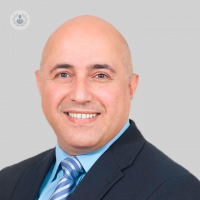An expert's guide to circumcision
Written by:Circumcision is a very common procedure, performed for medical, cultural and religious reasons. In his latest article, leading consultant urological surgeon Mr Aza Mohammed shares his expert insight into the procedure.

What is circumcision?
Circumcision as an operation involves the removal of the foreskin, which is the hooded part of the penile skin covering the tip of the penis.
Why is circumcision performed?
Circumcision is one of the oldest and most commonly performed operations in urology. It has been performed ritually in some faith groups as part of their religious traditions Outside the ritual indication, circumcision is mainly indicated in patients with narrow foreskin.
Narrowing of the foreskin is mainly caused by an inflammatory condition called balanitis xerotica obliterans (BXO). This causes scarring of the foreskin in the long term, which manifests itself clinically as difficulty in retracting the foreskin and whitening at the tip of the foreskin. It can sometimes cause discomfort during intercourse as well as cracking and bleeding. This can ultimately lead to abstinence from sex.
Narrowing of the foreskin can also lead to repeated infections called balanitis, which can cause pain and discharge. Balanitis is mainly caused by the difficulty to clean the tip of the penis as a result of the inability to retract the foreskin.
Moreover, Circumcision can also be performed as part of investigating abnormal lesions on the foreskin that could be a sign of a more sinister disease.

Are there any other treatments for Balanitis Xerotica Obliterans (BXO)?
The first line of treatment in cases of BXO is to use topical steroids. This can be effective in some patients. In severe cases of BXO or those for whom medical therapy is ineffective circumcision is usually indicated.
What does the circumcision procedure entail?
Circumcision can be done under general or local anaesthesia. The operation is mainly done as a day case. The possible risks include infection, bleeding and transient alteration in penile sensation. It is highly recommended that patients abstain from sexual intercourse until healing is complete (2-4 weeks) to avoid the risk of infections or disruption of the wound.
Mr Aza Mohammed is a leading consultant urological surgeon based in Luton, London, Bushey and Hatfield. With more than 25 years of experience, Mr Mohammed is an expert in a wide range of urological procedures. If you would like to book a consultation with Mr Muhammed, you can do so via his Top Doctor's profile.


